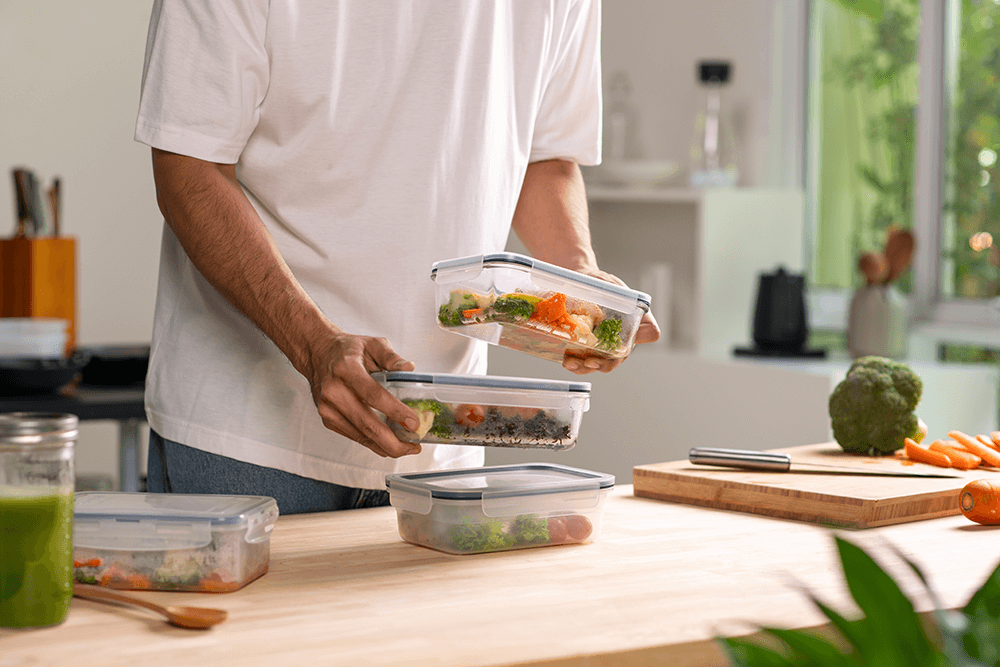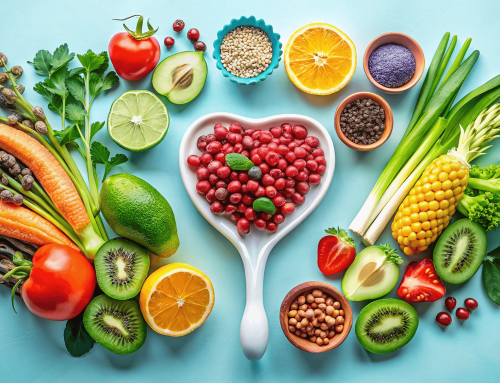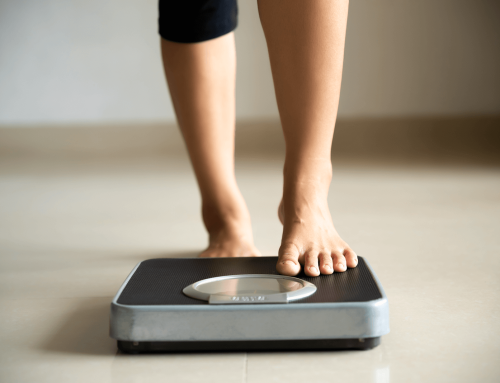Wegovy® (semaglutide) and Mounjaro™ (tirzepatide) have become some of the most talked-about weight loss medications in recent years. They’re increasingly available both privately and, in limited cases, through the NHS. These injections work by mimicking hormones in the body that regulate hunger and satiety, making it easier to eat less and lose weight.
But here’s what the headlines don’t always tell you: your diet and lifestyle choices matter more than ever while taking these medications. The injections help suppress your appetite and keep you fuller for longer, but if you don’t eat the right foods, stay hydrated, and keep active, you could run into problems—fatigue, nutrient deficiencies, muscle loss, or even weight regain once you stop the medication.
This guide is here to help you understand exactly what to eat on Mounjaro or Wegovy, which foods to avoid, and how to make the most of your weight loss journey for long-term success.
How Do Wegovy and Mounjaro Work?
Both Wegovy and Mounjaro belong to a group of medicines called GLP-1 receptor agonists. They mimic the hormone GLP-1 (glucagon-like peptide-1), which plays an important role in appetite regulation.
GLP-1 works in two key ways:
- It tells your brain you’ve had enough to eat, switching off hunger signals so you naturally eat less.
- It slows stomach emptying, keeping food in your stomach for longer so you feel fuller between meals.
Mounjaro goes one step further. In addition to mimicking GLP-1, it also acts on another hormone called GIP (glucose-dependent insulinotropic polypeptide), which is thought to enhance appetite control and help regulate blood sugar even more effectively.
The bottom line? Both medicines suppress appetite, reduce portion sizes, delay stomach emptying, and help stabilise blood sugar levels—all of which make losing weight easier. But they don’t remove the need for thoughtful food choices.
Why Diet Still Matters
Because these injections make you feel less hungry, you’ll naturally eat less. But that also means you risk eating too little of the right nutrients. The most common problems people run into include:
- Low energy and fatigue
- Nutrient deficiencies (iron, calcium, vitamin D, iodine, B12, folate)
- Constipation or diarrhoea
- Loss of muscle mass instead of fat
The solution is to focus on quality over quantity. Every bite matters when your appetite is suppressed—so it’s essential to choose nutrient-dense foods that give you maximum benefit.
Protein: Your Non-Negotiable When On Mounjaro Or Wegovy
Protein often feels like the hardest food group to manage when you’re on Wegovy or Mounjaro. With your appetite reduced, you may find yourself leaning towards plainer or blander foods, which can make protein feel unappealing. That’s normal—but it doesn’t make it less important.
The reality is that protein is non-negotiable if you want to lose fat while protecting muscle. Without enough, your body risks breaking down muscle tissue, slowing your metabolism, and making it harder to maintain weight loss in the long run. Protein is also vital for recovery, immune health, and keeping you feeling satisfied between meals.
A good daily target is around 1.5 grams of protein per kilogram of body weight. For someone weighing 100 kg, that’s roughly 150 g of protein per day. It can sound like a lot—and you don’t need to hit it perfectly every single day—but being mindful of your choices will make a huge difference.
This is where you need to be savvy with your food options. Convenient sources of protein can help, especially on days when eating feels like a chore:
- Protein powders: Choose a high-quality brand with minimal sugar or additives. One scoop typically gives you ~30 g of protein. Add 250 ml of milk (~10g of protein) and some berries or fibre, and you’ve got a 40–50 g protein shake—much easier to stomach than a heavy meal.
- Tinned fish: Salmon, tuna, or mackerel tins contain 25–30 g of protein and are inexpensive, convenient, and shelf-stable.
- Cottage cheese: A simple, high-protein snack that can be eaten plain or with fruit and crackers.
- Edamame beans and mixed pulses: Great plant-based protein sources, either fresh or in ready-to-eat pouches.
- Nuts and seeds: Easy to snack on, though watch portions as they’re calorie-dense.
- Wholegrain snacks: Crackers, cereal bars, or homemade energy balls made with oats, nut butter, and seeds.
- Other options: Smoked oysters, light cheeses, Greek yoghurt, or fortified dairy-free alternatives.
Signs You’re Not Getting Enough
Not fuelling your body properly can show up as:
- Fatigue
- Hair loss
- Poor exercise recovery
- Digestive changes (constipation or diarrhoea)
In many cases, these problems are linked to low overall intake, or specific deficiencies such as low iron. Ignoring these signals can lead to injury, illness, or prolonged poor health—so it’s crucial to take them seriously.
When to Get Professional Support
Behaviour change is hard, and it’s unrealistic to expect yourself to overhaul your entire lifestyle in one go. That’s why we believe every person embarking on a weight-loss journey should have dietetic support, particularly if you’re:
- Struggling to meet protein goals
- Finding it hard to adapt your daily routine
- Experiencing side effects or signs of under-fuelling
- Hitting a plateau after initial progress
I can help identify gaps in your diet, recommend evidence-based supplements if needed, and work alongside your prescriber to adjust your plan. Simple tweaks can often restart progress and prevent longer-term setbacks.
Fibre and Hydration
GLP-1 medications can slow digestion, so constipation is a common side effect. To keep things moving:
- Drink 2–3 litres of water daily (check your urine—it should be light yellow).
- Choose fibre-rich foods like wholegrains, fruit, vegetables, beans and lentils.
- Add flaxseed, ground flaxseed, or psyllium husk, but only if you’re drinking enough water.
Foods with naturally high water content—melon, cucumber, yoghurt, soups—also support digestion and hydration.
Foods to Avoid on Wegovy and Mounjaro
There are no absolute “forbidden” foods, but some are best minimised because they can worsen side effects or undermine your progress:
- Highly processed foods (biscuits, cakes, crisps, fried foods) – calorie-dense with little nutrition
- Sugary drinks and alcohol – empty calories and dehydration risk
- Very fatty or spicy meals – can worsen nausea and indigestion
- Simple carbs alone (white bread, pastries, sweets) – cause blood sugar spikes and energy crashes
Instead, build meals around protein, whole grains, vegetables, fruit, and healthy fats like olive oil, nuts and avocado.
Sample Day: What to Eat on Wegovy or Mounjaro
Here’s an example of a small, balanced day of eating that supports your medication:
- Breakfast: Poached egg on wholegrain toast with a milky coffee, or Greek yoghurt with berries and seeds
- Morning snack: A banana with a few almonds
- Lunch: Lentil and roasted vegetable salad with grilled salmon or chicken, plus wholegrain crackers
- Afternoon snack: Babybel cheese or plant-based alternative with an apple
- Dinner: Grilled chicken or tofu with ratatouille and a small serving of quinoa
- Evening snack (if needed): Handful of air-popped popcorn or a protein smoothie
Remember: small, nutrient-dense meals are better than grazing on low-quality snacks throughout the day.
Exercise: Your Secret Weapon
Food and medication alone aren’t enough—exercise is crucial for shaping your weight loss results.
If you’re new to movement, start gently: stretching, walking, yoga or Pilates. If you spend long hours at a desk, a standing desk (many cost under £100) helps reduce sedentary time and improves daily energy burn.
Pilates is excellent for posture and flexibility, but it doesn’t replace true resistance training, which is vital to maintain muscle and bone strength during weight loss. Include weights, resistance bands, or bodyweight exercises two to three times a week.
Cardiovascular activity also matters. Brisk walking, cycling, or swimming boosts heart health, and HIIT (high-intensity interval training) can improve fitness quickly—but only if your energy levels allow. If you’re feeling drained, forcing yourself into intense workouts may backfire, leading to injury.
The golden rule: feed your muscles and use them, or lose them.
Managing Common Side Effects on Mounjaro or Wegovy
- Constipation: Increase water, eat high-fibre foods, and add flaxseed or psyllium husk (with extra fluids).
- Diarrhoea: Flaxseed and psyllium husk can also help regulate loose bowels.
- Nausea: Try ginger tea, sugar-free chewing gum, mint sweets, or even a menthol inhaler.
If side effects persist, consult your GP or dietitian for tailored advice.
FAQs
Can I eat normally on Wegovy?
Yes, but your appetite will be lower. Focus on whole, nutrient-dense foods to make every bite count.
What’s the best exercise on Mounjaro?
A combination of resistance training (2–3 times per week) and regular cardio. Add daily movement like walking to avoid being sedentary.
Is it OK to skip meals while on injections?
No. Skipping meals can worsen fatigue and nutrient deficiencies. If you’re not hungry, opt for liquid nutrition such as a protein shake, a smoothie, or a glass of milk.
How much water should I drink on semaglutide?
Aim for 2–3 litres a day. Monitor your urine colour—it should be pale yellow, not dark.
Will I lose muscle on Mounjaro?
You can if you don’t take steps to prevent it. Prioritise protein and include resistance training to preserve lean muscle. At Essex Private Doctors, we offer body composition testing to monitor fat and muscle changes and adjust your plan accordingly.
Long-Term Maintenance: Thinking Ahead
Many people regain weight after stopping GLP-1 medication because they haven’t built sustainable habits. The key to avoiding this is:
- Nutrient-dense eating that feels realistic long-term
- Strength training to maintain muscle
- Regular monitoring of bloods and body composition
- Support for accountability and problem-solving
Final Thoughts
Wegovy and Mounjaro are powerful tools for weight loss, but they aren’t magic bullets. Think of them as scaffolding: they support you while you put healthier habits in place. What you eat, how much you move, and how you take care of your body will ultimately determine whether your results last a few months—or a lifetime.
If you’re considering weight-loss medication, or you’re already on it and want professional support, as a registered dietician, I can help you create a personalised nutrition plan that keeps you energised, prevents nutrient deficiencies, and maximises fat loss while protecting muscle.
Book an appointment today and take the next step towards a healthier, more confident future>
Florence Rowe. Registered Dietitian.





